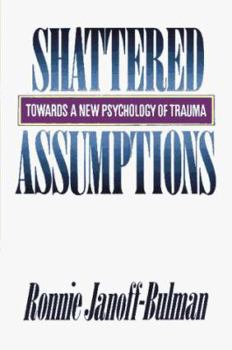Shattered Assumptions: Towards a New Psychology of Trauma
Select Format
Select Condition 
Book Overview
This book investigates the psychology of victimization. It shows how fundamental assumptions about the world's meaningfulness and benevolence are shattered by traumatic events, and how victims become... This description may be from another edition of this product.
Format:Hardcover
Language:English
ISBN:0029160154
ISBN13:9780029160152
Release Date:April 1992
Publisher:Free Press
Length:256 Pages
Weight:1.20 lbs.
Dimensions:1.1" x 6.5" x 9.6"
Customer Reviews
2 ratings
Great for understanding CISM and other trauma-related issues
Published by Thriftbooks.com User , 21 years ago
Janoff-Bulman describes what happens to a person, male or female, when dealing with sudden life-disrupting events. The two greatest "assumptions" or basic beliefs assaulted by trauma are that the world is safe and that I am a valuable asset in it. She speaks to victims and therapists alike in non-clinical terms that are healing and educational. Therapists could easily recommend this book to persons surviving traumatic events.
Good, easily understood material for the lay-person
Published by Thriftbooks.com User , 24 years ago
who: 1. Wants a basic, cognitive foundation in understanding how personal schemas, or ways of looking at and interpreting the world, are formed; 2. How change that causes us to question our basic assumptions that a. The world is benevolent, b. The world is meaningful, and c. The self is worthy -- can lead to psychological trauma including uneasy heightened physiological responses, feelings of anxiety, and a confrontation with the illusion that we are immune to death. Janoff-Bulman argues that the "adjustment of survivors rests largely" on their level of disillusionment and whether they despair or remain hopeful after a traumatic experience. The author does a quite adequte job of explaining the personal benefits of working through the trauma and learning to cope with change, and explaining why the ones we love the most are sometimes the least helpful, or even harmful, in supporting us in developing a new self and world view. Instead of just leaving us there, the author continues by telling us how others can be helpful in different ways and the fact that no one person can "be everything" or sole supporter of a traumatized individual. Finally, we are given a criteria for "ordinary levels of effective functioning" that can be used to gauge recovery. Perhaps the most valuable portion of this book, though, are the extensive Notes and Listing of References that help one to expand their research into trauma effects and recovery. The negative of this book is the author's overindulgance in rehashing psychotherapy's classic view of dissociative states as, the least,counterproductive to recovery, and, at most proof of psychosis. The author might have spent more time discussing how denial, a mild dissociative state, is "underappreciated," and is actually a coping mechanism that protects one from the overwhelming jar of dealing with every aspect of trauma at once. Overall a very good tool for the lay-person to use in understanding why trauma feels so bad, why others don't seem to understand and can even blame the traumatized for their own plight, and finding assurance that the traumatic experience can lead to a stronger self-image and more flexible take on change and reality. Highly recommend this book be purchased and kept in a secure place for easy access when trauma does catch one off guard.




